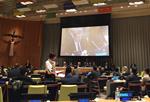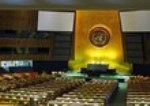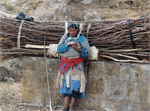Social Watch news
Published on Fri, 2015-04-17 09:29
As the negotiations on the zero draft of the Third Financing for Development Conference (FFD3) progress civil society organizations, Governments and the UN met at the occasion of the roundtable entitled Towards a Private Sector Accountability Protocol for Sustainable Development to discuss the proposal of a Private Sector Accountability Protocol for Sustainable Development. Such a framework would entail, among others, mandatory social and environmental reporting and financial transparency rules to align the private sector’s activities with SDG’s and human rights obligations. Most agree that the private sector plays an important role in development as it creates jobs, transfers technology, spurs innovation and allows for economic growth. However, as the private sector entities’ main goal is to make a profit, in some cases obtained at the expense of the environment and of human rights, there continue to be widespread concerns over their involvement in development. |
Published on Fri, 2015-04-17 09:20
Between 2008 and 2014, the Banco Nacional de Desenvolvimento Econômico e Social (BNDES), Brazil’s leading development finance institution, disbursed more than Brazilian Reals 654 billion. Of that total, approximately Brazilian Reals 289 billion (44 per cent) was earmarked for infrastructure, logistics and energy, considered strategic areas underpinning Brazil’s chosen model of economic growth, which rests on large-scale exports of agricultural and mining commodities. The BNDES holds a larger portfolio than multilateral institutions including the World Bank and the Inter-American Development Bank. What is more, in recent years, it has taken on a leading role – much to the benefit of major Brazilian corporations – as one of the main funders of infrastructure projects in Latin America |
Published on Thu, 2015-04-16 10:02
For the first time, the international development agenda, through the FfD3 and post-2015 processes, is considered universal, applying to every country. Current deliberations, however, reveal different understandings of what universality means. To some, the concept overshadows the principle of ‘common but differentiated responsibilities’ (CBDR), agreed in the Rio Declaration and reaffirmed by subsequent global and international documents—a concern voiced by the Indian delegate among others. CBDR roots governments’ obligations in their capacities to solve a given problem, as well as their responsibility for creating it (e.g., historic CO2 emissions). |
Published on Wed, 2015-04-08 11:07
At the opening of the United Nations hearings with business and civil society, Social Watch coordinator Roberto Bissio defends Sustainable Development Goals as expression of a new paradigm. For the SDGs to bare fruit, the power of the biggest 200 corporations, with combined sales that are bigger than the total economies of 180 countries, needs to be harnessed. The UN should not tarnish its image associating its programs with big tax evaders or endorsing private-public partnerships that are exclusive, untransparent and too frequently associated with corruption. A binding legal instrument for business and human rights, while disliked by business leaders, might introduce a predictable framework that ultimately benefits the small and medium entrepreneurs that create most of the jobs in times of crisis. Read his complete intervention here or see the video here or download the pdf version here. |
Published on Tue, 2015-04-07 09:44
The post-2015 development agenda aspires to global transformation. Its content so far, including the set of 17 sustainable development goals (SDGs) agreed in last year’s Open Working Group, affirms that aim through an unprecedented commitment to inclusion, sustainability and universality. This suggests that the world might finally move beyond current imbalanced patterns of consumption and production that have left wide swathes of human deprivation and pushed the limits of planetary boundaries. Yet the main question, after the most recent intergovernmental negotiations on the agenda in March in New York, is: will the political process live up to the agenda’s promise? |
Published on Mon, 2015-04-06 12:00
It is clear that traditional official development assistance will not be enough to finance the SDGs. It will continue to play a key role in the poorest countries and in countries destabilized by strife and conflicts. Alliance Sud is therefore calling for at least half the development budgets of donor countries to go towards the poorest countries. Should development aid budgets remain just as big – or small – as hitherto, greater concentration on the poorest countries would nonetheless create big losers as well. In middle-income countries, current development assistance programmes and projects would have to be abandoned. Total expenditure would need to be increased substantially if this is to be avoided. The old demand for 0.7 per cent of gross national income to be allocated to development aid has therefore lost none of its urgency. |
Published on Mon, 2015-04-06 10:47
The High Level Task Force for the International Conference on Population and Development (HLTF for ICPD) released a paper called “Policy Considerations for Financing Sexual and Reproductive Health and Rights in the Post-2015 Era”. The document makes the case about the importance of sexual and reproductive health and rights (SRHR) for achieving sustainable development and proposes nine recommendations to mobilize sufficient and predicable financing for SRHR services and policies. |
Published on Mon, 2015-03-23 00:00
When the World Economic Forum (WEF) met last January in Switzerland, attended mostly by the rich and the super-rich, the London-based charity Oxfam unveiled a report with an alarming statistic: if current trends continue, the world’s richest one percent would own more than 50 percent of the world’s wealth by 2016. And just 80 of the world’s richest will control as much wealth as 3.5 billion people: half the world’s population. The post-2015 development agenda will only succeed if the SDGs include meaningful and time-bound targets and commitments for the rich that trigger the necessary regulatory and fiscal policy changes. |
Published on Sun, 2015-03-22 00:00
At its 14th session, last February, the Human Rights Council Advisory Committee (“the Advisory Committee”) addressed for the first time the impacts of so-called vulture funds on human rights. “Vulture fund” is a generic name used to designate financial entities that use as a profit-making strategy the purchase of distressed debt owed by a sovereign debtor – that is, a State- on the cheap with the purpose of suing for the full amount once conditions for repayment improve. In a resolution adopted last September, the Human Rights Council entrusted the Human Rights Council Advisory Committee with the preparation of “a research-based report on the activities of vulture funds and the impact on human rights.” In preparation of that report it requested the same Committee to seek views of, among others, national human rights institutions and non-governmental organizations, human rights mechanisms, Member States and relevant international and regional organizations. |
Published on Fri, 2015-03-20 10:45
On Monday, the 23rd of March 2015, government representatives will meet at UN Headquarters for five days of negotiations on the SDG’s goals, targets and indicators. Governments should resist the temptation –particularly when looking at targets and indicators- to be restricted by existing quantitative monitoring systems and the current (and limited) availability of data. Instead, Governments should set a truly transformative and ambitious framework, which will lay the ground for innovative monitoring systems, which include qualitative assessments for key SDG targets such as “policy space” and “justice for all”. Voices of citizens need to be heard to capture the dark corners of inequalities within and among countries and to channel the potential of a 'data revolution' without infringing on privacy or sovereignty. |
SUSCRIBE TO OUR NEWSLETTER









